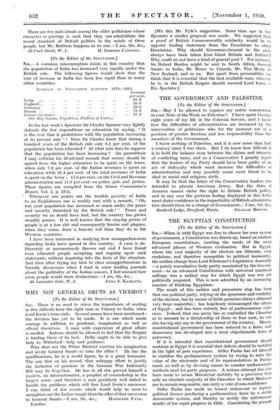[To the Editor of the SPECTATOR.] SIR,—A common misconception exists
in this country. that the population of India has increased very rapidly under the British rule. The following figures would show that the rate of increase in India has been less rapid than in many other countries.
INCREASE (IF POPULATION BETWEEN 1870-1910.
Increase per cent.
India .. 18.9 England.. 58.0 Germany 59.0 Russia .. 73.9
Europe (average)
45.4
(See Brij Narain, Population Problem of India.) In the last week's Spectator Sir Charles Spencer very lightly defends the low expenditure on education by saying, " It is the cost that is prohibitive with the population increasing at its present rate " ! Does Sir Charles know that during a hundred years of the British rule only 8.1 per cent. of the population has been educated ? At what rate does he suppose that the population has been increasing ? (In parenthesis I may criticize his ill-advised remark that money should be spared from the higher education to be spent on the lower, when only 7.2 per cent. of the Indian revenues is spent on education while 31.4 per cent. of the total revenues of India is spent on the Army ; 15.6 per cent. on the Civil and Revenue administration and 11.8 per cent. on police, jails and justice. These figures are compiled from the Simon Commission's Report, Vol. 2, p. 215).
' Whenever one points out the terrible poverty of India to an Englishman one is readily met with a remark, " Oh, but your population has increased so much under the peace and security furnished by the British, rule ! " Peace and security we no doubt have had, but the country has grown steadily poorer. It is well known that the staying power of people is at a low ebb and consequently famine and plagues, when they come, draw a heavier toll than they do in the Western countries.
I have been interested in studying how misapprehensions regarding India have spread in this country. A yarn is de- liberately or unconsciously thrown out and I have found even educated people accepting and arguing upon such statements without inquiring into the facts of the situation. And then after trying my best to clear misapprehensions in friendly discussions when I read in some leading journals about the gullibility of the Indian masses, I feel amused how some people would draw distinctions.—I am, Sir, &c.,










































 Previous page
Previous page